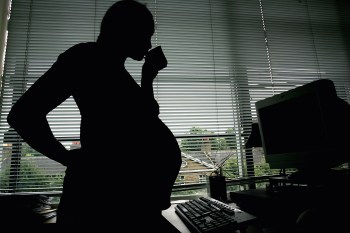
A new law aims to better protect pregnant and postpartum workers
A new law aims to better protect pregnant and postpartum workers

On Tuesday, a new federal law called the Pregnant Workers Fairness Act went into effect. It requires employers to provide “reasonable accommodations” for pregnant and postpartum workers — for instance, providing chairs for people who are on their feet all day.
It’s news that might leave you thinking, ‘Wait, we didn’t already have these protections?’
Armanda Legros said that had already had one miscarriage from work. She was with an armored truck company in Long Island, New York, and had to lift 50-pound bags of coins. During her next pregnancy in 2012, she pulled a muscle in her stomach. So, Legros said she brought a doctor’s note to her employer, which said she couldn’t do heavy lifting.
“They sent me home without pay indefinitely,” she said.
Ultimately, they fired her, Legros said. She asked her boss why. His answer? “I couldn’t work with any restrictions, which I knew wasn’t true because they accommodated a male employee that had a back problem.”
At that point, Legros was six months pregnant. “I was showing, and I wasn’t able to secure any employment and had to rely on food stamps. And it was a very, very difficult time.”
Her son Ayden is now 10 years old. Legros is now a community advocate with A Better Balance, and supported the new law.
If the same thing happened to her today, it would be different, because of the new law that protects pregnant workers. Legros’ employer would be required to, for instance, assign her more administrative work.
Before, the only way to get an accommodation was to have a pregnancy-related disability under the Americans with Disabilities Act, explained Joan Williams, a professor at UC Law San Francisco. “That was the way we threaded the needle,” she said.
But that solution required a lot of knowledge and legwork. It also left many workers out, since pregnancy itself is not a disability.
The Pregnant Workers Fairness Act is especially important for low wage workers, Williams added. “These jobs are often very physical.”
They can also come with limited bathroom breaks and frequent exposure to toxins.
This new law will help keep expecting workers and their wages safe, according to Molly Weston Williamson at the Center for American Progress.
“Because those who are pushed out of the workplace or forced to take a downgrade in relation to pregnancy often continue to have impacts from that throughout the rest of their lives,” she said.
One study says that the average mother in the U.S. loses 4% in wages for every child she has. For low-wage workers, that number is nearly 7%.
There’s a lot happening in the world. Through it all, Marketplace is here for you.
You rely on Marketplace to break down the world’s events and tell you how it affects you in a fact-based, approachable way. We rely on your financial support to keep making that possible.
Your donation today powers the independent journalism that you rely on. For just $5/month, you can help sustain Marketplace so we can keep reporting on the things that matter to you.

















